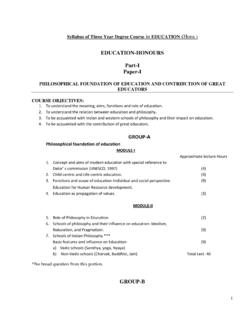Transcription of DEVELOPMENT COMMUNICATION IN INDIA: PROSPECT, …
1 1 Commentary Global Media Journal Indian Edition/ISSN 2249-5835 Winter issue / December 2011 Vol. 2 DEVELOPMENT COMMUNICATION IN india : PROSPECT, ISSUES AND TRENDS Vineet Kaul Pursuing in COMMUNICATION from Dhirubhai Ambani Institute of Information and COMMUNICATION Technology University, Gandhinagar; Gujarat; india Email: Abstract: How did the discipline and practice of DEVELOPMENT COMMUNICATION begin?
2 Who were the founders and how were the first experiments implemented? The purpose of this paper is to provide an overview of DEVELOPMENT COMMUNICATION . To do so, the first section focuses on the theoretical perspective and evolution of DEVELOPMENT COMMUNICATION . This study then specifies the components of DEVELOPMENT COMMUNICATION and, having done so, proceeds to evaluate the various approaches to this conceptual formulation. Thus, it discusses the extension and community DEVELOPMENT approach, the ideological and mass mobilization method, the centralized mass media method, the localized mass media method, and the integrated approach.
3 It concludes that since DEVELOPMENT COMMUNICATION is not simply concerned with the mere provision of information on DEVELOPMENT activities, it should not stop with conventional mass media. Rather, it must involve strong components of social organization and interpersonal and traditional modes and media if it is to succeed. Keywords: DEVELOPMENT COMMUNICATION , community DEVELOPMENT , mass media methods, social organizations, changing technologies Introduction 2 DEVELOPMENT and COMMUNICATION are two terms heavily loaded with different conceptions and a richness of uses and functions shaped by their various theoretical underpinnings.
4 Such richness often leads to ambiguities and a lack of clarity that affects the field of DEVELOPMENT COMMUNICATION . The wide range of interpretations of key terminology and the rapid evolution of some concepts have led to inconsistencies in the way basic terms are understood and used. What we have here, in fact, is more of an approach than a discipline. As far as its definitions are concerned, they usually consist of general statements. Thus, the COMMUNICATION media, in the context of DEVELOPMENT , are generally used to support DEVELOPMENT initiatives by the dissemination of messages that encourage the public to support DEVELOPMENT -oriented projects.
5 Although DEVELOPMENT strategies in developing countries diverge widely, the usual pattern for broadcasting and the press has been predominantly the same: informing the population about projects, illustrating the advantages of these projects, and recommending that they be supported. A typical example of such a strategy is situated in the area of family planning, where COMMUNICATION means such as posters, pamphlets, radio, and television attempt to persuade the public to accept birth control methods.
6 Similar strategies are used in campaigns regarding health and nutrition, agricultural projects, education, and so on. The concept of DEVELOPMENT COMMUNICATION arose within the framework of the contribution that COMMUNICATION and the media made to DEVELOPMENT in the countries of the Third World. DEVELOPMENT communications are organized efforts to use communications processes and media to bring social and economic improvements, generally in developing countries. The field emerged in the late 1950's amid high hopes that radio and television could be put to use in the world's most disadvantaged countries to bring about dramatic progress.
7 Early communications theorists like Wilbur Schramm and Daniel Lerner based their high expectations upon the apparent success of World War II propaganda, to which academia and Hollywood had contributed. Also with World War II came dozens of new, very poor, countries, left by their former colonial overseers with little infrastructure, education, or political stability. It was widely accepted that mass media could bring education, essential skills, social unity, and a desire to "modernize.
8 " Walt Rostow theorized that societies progress through specific stages of DEVELOPMENT on their way to modernity, what he termed "the age of high mass consumption." Lerner suggested that exposure to Western media would create "empathy" for modern culture, and a desire to move from traditional to modern ways. Early DEVELOPMENT communications, especially that sponsored by the government, was also seen as a means of "winning hearts and minds" over to a capitalist way of life.
9 These early approaches made a number of erroneous assumptions, and have been largely forsaken in contemporary approaches to DEVELOPMENT . Obstacles to DEVELOPMENT were naively 3 seen as rooted in developing countries, not as products of international relationships. Modernization was presumed to equate to Westernization, and to be a necessary prerequisite to meeting human needs. DEVELOPMENT was seen as a top-down process, whereby centralized mass media could bring about widespread change.
10 Producers of DEVELOPMENT media often failed to ask if the audience can receive the message (television penetration in developing countries is minimal and radio penetration in the early days of DEVELOPMENT COMMUNICATION was light), understand the message (a problem in countries with dozens of languages and dialects), act upon the message (with the necessary tools or other forms of structural support), and want to act upon the message. And because it was based upon a propaganda model, DEVELOPMENT communications efforts were often seen as propaganda and distrusted.


















